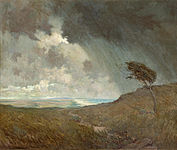Granville Redmond
This article includes a list of general references, but it lacks sufficient corresponding inline citations. (March 2020) |
Granville Redmond | |
|---|---|
 Self-portrait (1919) | |
| Born | Granville Richard Seymour Redmond March 9, 1871 |
| Died | May 24, 1935 (aged 64) Los Angeles, California |
| Nationality | American |
| Education | Impressionism, Tonalism |
| Known for | landscape painting |
Granville Richard Seymour Redmond (March 9, 1871 – May 24, 1935) was an American landscape painter and exponent of Tonalism and California Impressionism. He was also an occasional actor for his friend Charlie Chaplin.

Early years[edit]
Redmond was born in Philadelphia, Pennsylvania on March 9, 1871 to a hearing family. He contracted scarlet fever at around 2½ to the age of 3; when he recovered, he was found to be deaf. This change may have prompted his family's decision to move from the East Coast to San Jose, California: the possibility for his education at the Berkeley School for the Deaf.
Study[edit]

Granville attended the California School for the Deaf in Berkeley from 1879 to 1890 where his artistic talents were recognized and encouraged. There his teacher Theophilus d'Estrella taught him painting, drawing and pantomime.[1]
When he graduated from CSD, Redmond enrolled at another CSD: the California School of Design in San Francisco, where he worked for three years with teachers such as Arthur Frank Mathews and Amédée Joullin. He famously won the W.E. Brown Medal of Excellence. He associated with many other artists, including Gottardo Piazzoni and Giuseppe Cadenasso. Piazzoni learned American Sign Language, and he and Redmond became lifelong friends. They lived together in Parkfield, California and Tiburon, California.
In 1893 Redmond won a scholarship from the California School of the Deaf, which made it possible for him to study in Paris at the Académie Julian under teachers Jean-Paul Laurens and Jean-Joseph Benjamin-Constant. He roomed with the sculptor Douglas Tilden, another graduate of the California School for the Deaf. "Tilden was a tremendous help to Redmond, teaching him French and how to get around in Paris; they became best friends for the rest of their lives."[2] In 1895, Redmond's painting Matin d'Hiver was accepted for the Paris Salon.
Back in California[edit]
In 1898, he returned to California and settled in Los Angeles. He was married in 1899 to Carrie Ann Jean, a former student of the Illinois School for the Deaf. They had three children.
Working with Chaplin[edit]

While living in Los Angeles, he became friends with Charles Chaplin, who admired the natural expressiveness of a deaf person using American Sign Language. Chaplin asked Redmond to help him develop the techniques Chaplin later used in his silent films. Chaplin, impressed with Redmond's skill, gave Redmond a studio on the movie lot, collected his paintings, and sponsored him in silent acting roles, including the sculptor in City Lights. Chaplin told a writer for The Silent Worker of a Redmond painting "I could look at it for hours. It means so many things" and Chaplin's famous The Dance of the Oceana Rolls was Redmond-inspired.
During this time Redmond did not neglect his painting. Through Chaplin, he met Los Angeles neighbor artists Elmer Wachtel and Norman St. Clair. They showed works at the Spring Exhibition held in San Francisco in 1904. By 1905, Redmond was receiving considerable recognition as a leading landscape painter and bold colorist.
He died on May 24, 1935 in Los Angeles.
Selected paintings[edit]
-
A Field of California Poppies
-
Malibu Coast Spring
-
Coastal Storm
Filmography[edit]
| Year | Title | Role | Notes |
|---|---|---|---|
| 1918 | A Dog's Life | Dance-hall owner | uncredited |
| 1919 | Sunnyside | uncredited | |
| 1919 | A Day's Pleasure | Boat Passenger | uncredited |
| 1921 | The Idle Class | Guest | uncredited |
| 1921 | The Kid | The Man's Friend | uncredited |
| 1921 | The Three Musketeers | undetermined | uncredited |
| 1923 | A Woman of Paris | Man in Nightclub | uncredited |
| 1925 | A Regular Fellow | unknown | uncredited |
| 1926 | You'd Be Surprised | Grey, the Butler/Deputy Coroner | |
| 1931 | City Lights | Sculptor | uncredited |
Collections[edit]
- Bancroft Library, University of California, Berkeley
- California School for the Deaf, Fremont
- Cantor Arts Center, Stanford
- Crocker Art Museum, Sacramento
- De Young Museum, San Francisco
- Granville Redmond Fine Art, Los Angeles
- Huntington Library, San Marino, California
- Los Angeles County Museum of Art
- K. Nathan Gallery, La Jolla, California
- Museum of the City of New York
- Oakland Museum of California
Awards[edit]
- Gold Medal, W. E. Brown Award, California School of Design, 1892
- Medal, Louisiana Purchase Exposition, 1904
- Silver Medal, Alaska-Yukon Pacific Exposition, Seattle, Washington, 1909
References[edit]
- ^ Gannon, Jack (1981). Deaf Heritage–A Narrative History of Deaf America (PDF). Silver Spring, MD: National Association of the Deaf. p. 136. Archived from the original (PDF) on 2012-04-24. Retrieved 2011-09-06.
- ^ Albronda 1994, p. 43
Bibliography[edit]
- Albronda, Mildred (1994). Douglas Tilden: The Man and His Legacy. Seattle, Washington: Emerald Point Press. ISBN 0-9637816-0-X.
External links[edit]
- Granville Redmond at IMDb
- Granville Redmond at AskART
- Granville Redmond at Artcyclopedia
- The Silence and Solitude of Granville Redmond at California Plein Air Paintings
- Overlooked No More: Granville Redmond, Painter, Actor, Friend at The New York Times
- 1871 births
- 1935 deaths
- 19th-century American painters
- American male painters
- 20th-century American painters
- Tonalism
- American Impressionist painters
- American landscape painters
- Deaf artists
- Painters from California
- Académie Julian alumni
- San Francisco Art Institute alumni
- American deaf people
- 19th-century American male artists
- 20th-century American male artists
- American artists with disabilities



